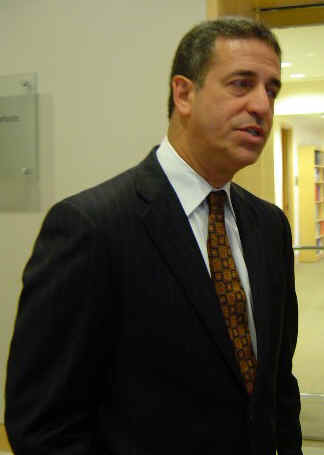|
|
Senator Russell Feingold (D- Wisconsin) spoke at the NationalConstitution Center here Monday to an enthusiastic crowd of MoveOn.Org PAC members, after appearing at a fundraiser for Congressional candidate Lois Murphy, hosted by Reed Smith. Feingold's topic was "Democracy Restored." He urged the audience to help him continue campaign finance reform, which he started with Senator John McCain.
(Photo: Bonnie Squires)
|
|
Special Dossier:
Decision 5767

Senator Russell Feingold
Urges progressive patriots to action.
-- Bonnie Squires
Senator Russell Feingold (D-Wisconsin) bounded onto the stage at the National Constitution Center in Philadelphia, the day after Rosh Hashanah, looking confident as he faced an enthusiastic large audience of MoveOn.Org PAC members in the Annenberg Education Center auditorium. He could almost taste victory for the Democratic Party and his Progressive Patriots supporters in the upcoming November elections. It must have seemed an appropriate way for Feingold to start the Jewish New Year, laying out his goals for the next Congress.
As the lone vote against the Patriot Act, Feingold is well qualified to critique the current Administration's actions and philosophy. He even credited his colleague, Senator Arlen Specter, with having put forth a bill which would incorporate and correct all of Feingold's objections to the original law, passed in the heat of 9/11 fear and anxiety. Of course, he added, "The bill won't go anywhere" because of the Republican majority that seems to be in lock-step with President Bush.
At one point in his "Democracy Restored" presentation, Feingold said, "This Administration and this President have two obsessions: first, to justify the tremendous mistake of our intervention in Iraq, and second, expanding executive power." He did not mince words when outlining the "Terrorist Surveillance Program," commenting, "The President put in place a manifestly illegal program that thumbs its nose at the law." He hastened to add that he agrees that our government would wiretap terrorists, but that we should do it according to the law.
He also was careful to explain that he had not proposed impeachment of Bush because of what he deems "illegal wiretapping," but he did propose a simpler resolution: censure. He wanted it to be on the record that the President had broken the law. And since the Wisconsin Senator serves on both the Senate Intelligence Committee and the Senate Judiciary Committee, he talks with authority when he says there was no legal basis for the extensive wiretapping. He also objects strongly to the commandeering of individual citizens' library records and medical records. And he referred to the recent Supreme Court decision that deemed the wiretapping without a warrant to be illegal.
Since the McCain-Feingold Bill is the quintessential campaign finance reform bill, Feingold also spent a lot of time talking about the need for public financing of elections. Requiring paper ballots as back-up to machine voting is also a priority of his. He told a delightful anecdote of his first run for office, about 25 years ago, when he first ran for State Senate in Wisconsin. Initiatlly, he had lost by 32 votes out of some 30,000 votes recorded. But during are re-count, he discovered that in his very own precinct, the opponent's tally began at number 32, instead of at the required zero. Feingold ended up being elected by a slim margin of 41 votes. If he had not checked the vote count, he said he would not have been here in his current position today.
Feingold was also incensed at the attempt to require photo identification for all voters, caling this a "mean-spirited" attempt to suppress voter turnout. He also urged reinstatement of voting rights for felons who have served out their sentence and returned to the community. The Federal Election Commission came in for special scrutiny by Feingold, as he called it a "rogue agency" and said that he and Senator McCain have introduced a bill to make the agency more responsible in enforcing campaign contribution violations.
During the question and answer period, Feingold was discreetly oblique when someone rose to urge him to run for President in 2008.
In a private conversation after his presentation, I asked him if he had been disappointed in his Democratic Senate colleagues for not overwhelmingly supporting his call for censure of President Bush. He quickly answered that Senators Boxer and Kerry, among others, had spoken out instantly in support of his motion. And then he was out the door, en route to Washington, for important Senate votes.
Reprinted with the permission of the author and the Main Line
Times.
|

